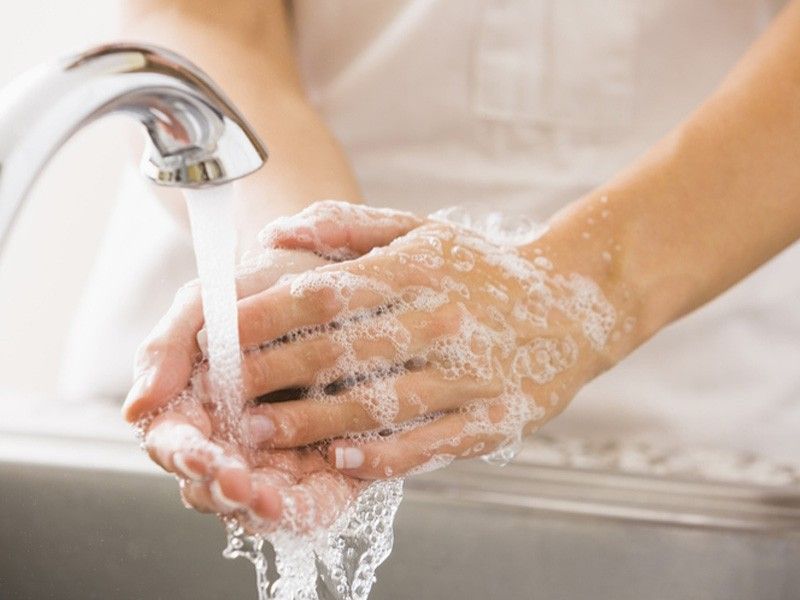50% of Pinoys don’t know safe handwashing – 2020 Handwashing Habits Survey

MANILA, Philippines — Ninety-nine percent of Filipinos have washed their hands more often in the last six months but just half are doing it right. That is according to the recent 2020 Philippines Handwashing Habits Survey that revealed only 50% of Filipinos practice proper steps for proper and safe handwashing, or #SafeWash.
Understanding bad hygiene
The study identified that “washing quickly with soap and water” is the commonly observed practice among other people, and that 50% are guilty of unsafe handwashing habits like washing without soap, washing for less than 20 seconds, or even just using tissue.
The survey revealed the “bahala na” and “pwede na” attitude of Filipinos when it comes to handwashing, despite frequent reminders from the World Health Organization (WHO) and the Department of Health (DOH).
These bad hygiene habits are a deep-rooted problem in every Filipino household. Several researches have shown that handwashing habits are developed early in life and become habitual behavior as people age. This poses the risk that when one grows up with poor hand hygiene habits, it can be ingrained for a lifetime without realizing it.
The recent study shares that incidents of unsafe handwashing were commonly observed at home, 40% of the respondents having at least seen someone they know practice improper handwashing.
In most instances, one of these poor practices were observed: the quick washing of hands, spraying a small amount of water to the hands, mere wiping or rubbing of hands, and the use of tissue paper to clean hands.
Effects of improper habits
Bad hygiene habits and improper handwashing is putting lives at risk. Unclean hands play a big role in the person-to-person transfer of germs and viruses that are responsible for infectious diseases like the common cold, influenza, chicken pox, and meningitis. Nosocomial infections like E. Coli and MRSA are also caused by the spread of germs and bacteria on the hands. Hepatitis A, a viral infection, is usually spread via food that has been contaminated by people preparing it who failed to wash hands after using the toilet.
One study even revealed that people touch their faces 17 times per hour. And because hands touch surfaces and objects where bacteria and viruses land and can stay—anywhere from 20 minutes to two days—not practicing safe wash will result in the direct transmission of these organisms into the opening of the eyes, nose, and mouth.
Safe wash against germs and viruses
Keeping hands clean is the most effective way to prevent the spread of germs and viruses. Safe wash involves the use of soap and running water and hand scrubbing with an adequate period of at least 20 seconds, in line with recommendations from the WHO and DOH.
The DOH highlights the importance of safe handwashing habits with following easy-to-do steps:
- First, wet hands with clean, running water and apply soap.
- Lather the hands and rub them together with soap by cleaning thoroughly from the back of the hands, the palm, between the fingers, under the nails.
- Scrub the hands for at least 20 seconds and not less.
- Then rinse the hands under clean and running water; and
- Finally, dry the hands using a clean towel.
Practicing safe wash before eating, after coming from outside the house, after using the toilet, after eating, and after shaking someone’s hands will greatly reduce the chances of contracting diseases.
DOH promotes proper 'safe wash' habits
In August, the DOH launched a nationwide information campaign with easy-to-remember BIDA Solusyon guidelines urging Filipinos to adopt measures to reduce the transmission of the virus. The guidelines include wearing masks, hand sanitation, social distancing, and obtaining of correct information about the pandemic.
The safe wash habit is proven to destroy the structure of the virus, thus, greatly minimizing chances of contracting and transmitting the virus. Practicing safe wash can strengthen our first line of defense against diseases, germs and viruses.
Every Filipino has a duty to teach and learn the value of a safe wash starting at home and it starts with abandoning the “pwede na” mentality.
Disclaimer: This is a sponsored post.


















